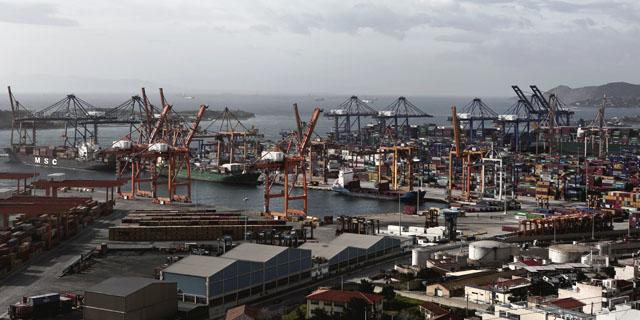You are here
Germany urges Greece to undertake reforms to unlock funds
By Agencies - May 17,2015 - Last updated at May 17,2015

BERLIN — German politicians kept up the pressure on Greece over the weekend to implement reforms, with Economy Minister Sigmar Gabriel warning Athens in an interview that a third aid package would not be on the cards unless the Greeks made some changes.
Greece is fast running out of cash and talks with its lenders have been deadlocked over their demands for Greece to implement reforms, including pension cuts and labour market liberalisation.
Finance Minister Wolfgang Schaeuble suggested last week that Greece might need a referendum to approve painful economic reforms on which its creditors are insisting, and Gabriel said such a vote might speed up decisions.
Athens has said it had no plans for a referendum at the moment.
Gabriel, head of the Social Democrats Party (SPD), Chancellor Angela Merkel's junior coalition partner, stressed that the Greek government needed to take action in any case.
"A third aid package for Athens is only possible if the reforms are implemented. We can't simply send money there," he told the paper.
German conservative lawmaker Markus Ferber told German news magazine Der Spiegel that there was no majority in Germany for a third aid package for Greece.
Athens has depended on money from its 240 billion euros bailout by the European Union and the International Monetary Fund (IMF) to pays its bills since 2010. It has not received any loan tranches since last August.
On Friday, Greek Prime Minister Alexis Tsipras said Athens had found some common ground with its foreign lenders but the government would not back down from its red lines, such as no cuts to wages and pensions.
Volker Kauder, parliamentary leader of Merkel's conservatives, told Germany's Welt am Sonntag newspaper that the situation was "very difficult" and "the Greeks must show that they are continuing down the agreed path".
He said people should not be talking about a third aid package for Athens when the final aid tranche from the second bailout had yet to be paid out.
Gabriel warned about the consequences of Greece quitting the single currency bloc, saying: "A Greek exit would not only be highly dangerous economically but also politically."
"Nobody would have any confidence in Europe anymore if we break up in our first big crisis. We shouldn't talk ourselves into a Grexit," he said.
But Hans-Peter Friedrich, deputy head of the conservative parliamentary group, told Der Spiegel: "If we don't insist on the reform commitments we'll really damage the currency union and this damage would be bigger than if Greece ultimately left."
Separately, Greek newspapers said Sunday that Tsipras had warned foreign officials that Athens would not be able to pay the 750 million euros ($845 million) due this month to the IMF.
The reports came less than a week after Athens admitted that it tapped into an emergency account to pay back the loan, in order to avoid crashing out of the eurozone.
On May 8, Tsipras wrote to European Commission, IMF and European Central Bank (ECB) officials to warn them that Greece would be unable to meet its May 12 deadline, unless its creditors agreed to release a final 7.2 billion euros ($8.2 billion) tranche of its bailout, Kathimerini daily said, citing European officials.
The newspaper also said Tsipras contacted US Treasury Secretary Jack Lew.
But Kathimerini said Greece's creditors saw the warning as a "possible bluff".
Greece won some support in the latest round of debt talks as it battles to keep itself solvent, but eurozone finance ministers have demanded more key reforms before they agree to release the funds.
Scrambling to pay its debt, the Greek government ended up drawing 660 million euros ($750 million) from a special account held at the IMF, and scraping together the rest of the sum just in time.
Tsipras also wanted 1.9 billion euros ($2.2 billion) in profits made by the ECB from Greek bonds purchased in 2010, and 1.2 billion euros ($1.4 billion) Athens claims it unduly paid to the European Financial Stability Facility.
Confirming the reports, Vima weekly said the Greek government warned it did not have the money to pay the IMF back.
The prime minister's office did not comment on the reports.
Billions more in loan repayments are due over the next three months.
Elsewhere, ratings firm Fitch kept Greece's high-risk credit rating unchanged Friday, saying the risk that the eurozone country would default on its debt was a "real possibility”.
Fitch Ratings affirmed the "CCC" rating it gave the debt-riddled eurozone country in late March in a two-notch downgrade from "B".
"Lack of market access, uncertain prospects of timely disbursement from official institutions, and tight liquidity conditions in the domestic banking sector are putting extreme pressure on Greek government funding," Fitch said in a statement.
"We expect that the government will survive the current liquidity squeeze without running arrears on privately held bonds, but default is a real possibility," it added.
"The damage to investor, consumer and depositor confidence has derailed Greece's economic recovery," Fitch indicated. "The damage will take time to repair even if prospects for a successful programme completion improve over the coming days or weeks."
The ratings firm forecast zero growth in the economy this year, with risks "heavily tilted" towards a contraction, as the country runs out of cash and faces debt payments to its creditors.
Still, Fitch said it was likely that Greece will reach a compromise deal with its official creditors.
"As a minimum requirement, we expect that the Eurogroup [eurozone finance ministers] will want the Greek government to demonstrate that it has taken some legislative action on structural reform before funds are disbursed. However, as yet, the reforms themselves have not yet been agreed. Time is therefore running short," it concluded.
Related Articles
BRUSSELS — Greece on Monday agreed to compromise on new bailout reforms in a bid to break a deadlock with its EU- International Monetary Fun
FRANKFURT () — Eurozone ministers approved the launch of Greece bailout talks and the European Central Bank (ECB) boosted its cash lifeline
ATHENS –– Greek lawmakers passed unpopular pension and tax reforms on Monday that a European official said marked a major advance in negotia



















